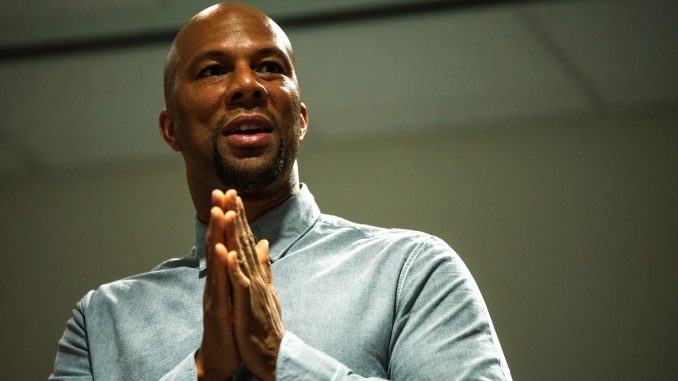
After Maya Angelou invited him to speak at a church service in Harlem, New York, Lonnie Rashid Lynn Jr., better known by his stage name Common, had a revelation.
“I remember getting up, speaking and I didn’t speak at the level that I wanted to. On the ride back home, my mother said, ‘You could actually do well at it, but you got to work and practice at it, really focus on it,’” Common told The Temple News. “At that moment I realized, ‘Hey, when I get these opportunities to speak, I need to have something to really say, not just go up there with my thoughts, because I want the new generation, I want the college students—whoever I’m speaking to—to walk away with something that they can live with.”
True to his word, Common visited Main Campus to deliver a lecture on achieving greatness in the Student Center on Thursday. In Room 200, Common spent the evening discussing his childhood, faith, relationships and experiences in the music industry with attending students.
Common kicked off the lecture by performing a freestyle rap about Temple, incorporating topics like alumna and trustee Tamron Hall and Maxi’s. Throughout the evening, he read quotes from his influences like Martin Luther King Jr. and Nelson Mandela. He then gave a personal take on faith, using light as a metaphor for self-confidence to reassure the crowd: “our light was created so we can put it on the lamp stand, and everyone that walks in the room can see it,” Common said.
The published author and successful actor believes addressing young adults in particular plays a role in shaping the future.
“I think it’s the college-aged students and people who have the energy, have the intelligence, have the drive to really come up with new things to better society,” Common said.
At 12 years old, Common worked as a ball boy for the Chicago Bulls, running equipment back and forth through a tunnel between locker rooms. He recounted to the crowd how he was so shaken after learning about the murder of Emmett Till in school, he started sprinting through the tunnel out of fear.
“It scared me, seeing this young boy, who was from Chicago just like me that, just for whistling, his life was taken,” he told the audience. “I felt this energy and this spirit down there.”

“I felt that, at that moment, whatever I do in life, I have to do it for those who lost their lives,” he added.
Later on in the night, Common described his time working with Kanye West during the creation of “Be,” Common’s 2006 album which was nominated for four Grammy Awards. One story detailed how during listening sessions with journalists, West “would hop up on the table and be rapping and sweating and spitting,’” which boosted Common’s faith in his own music.
“Belief is contagious,” he said to the audience.
Since he began his career in the early 1990s, Common has noticed a change in the hip-hop industry’s focus on monetization.
“It started to become more of a machine than it was a soul,” he said. “I’ve seen that change, but then again, you still always had artists that brought soul. No matter what. And now we still have it.”
Junior media studies and production major Danielle Snowden, a university event director for Main Campus Program Board, which organized the event, said she chose Common to speak for reasons beyond his musical talent.
“Common has a unique message, so he’s not only a rapper, he is a social activist,” she said. “The issues that he talks about definitely relate to this generation being such a conscious generation. He was very personable with the audience, and I think that’s something that you don’t always get from speakers.”
Freshman computer science major Derrick Sharper, who attended the lecture, felt inspired by Common’s words.
“It motivated me a little bit because I’m currently starting my own business,” Sharper said. “It gave me a new way of looking at things.“
“I liked how he took it back and said financial issues and any issues that you have, they’re valid but you have to recognize them as that to move forward,” said sophomore social work and African-American studies major Kayla Thomas, also in attendance.
The evening came to a close with a Q&A session, when Common answered pre-submitted questions from attendees. One question, submitted by junior Nick Davis, asked whether or not artists have a responsibility to be socially aware, positive role models.
“Being a good human being is still a duty of an artist too,” Common said to the audience. “It’s our responsibility, because we have a microphone to do something. To change the world in that way is important.”
Eamon Dreisbach can be reached at eamon.noah.dreisbach@temple.edu.


Be the first to comment